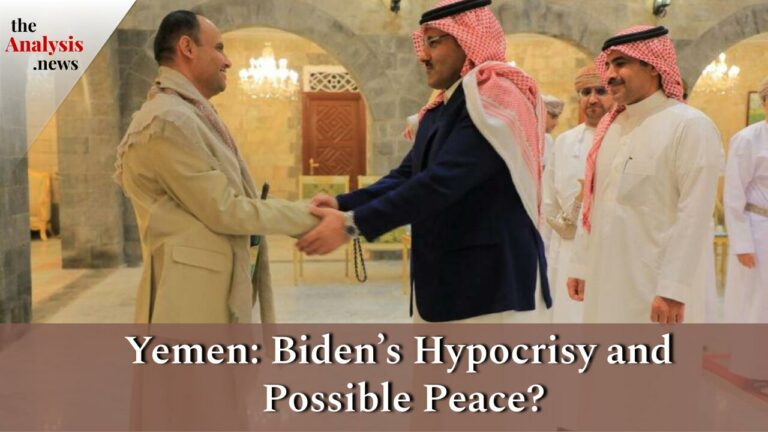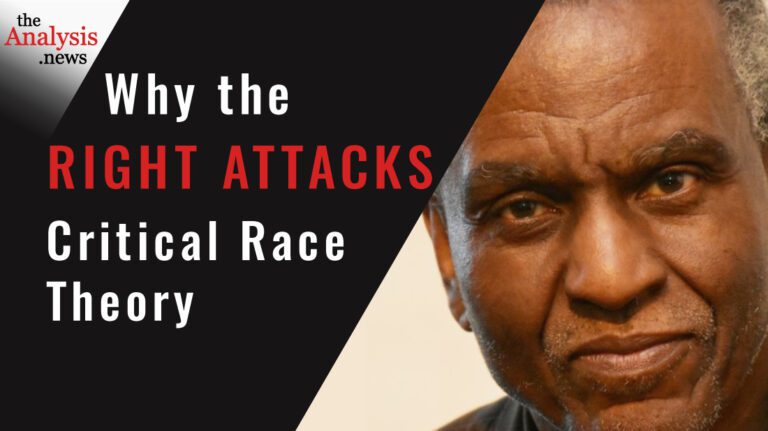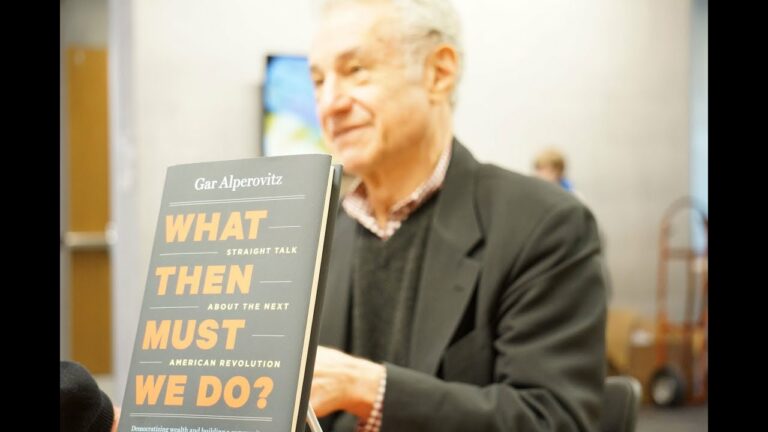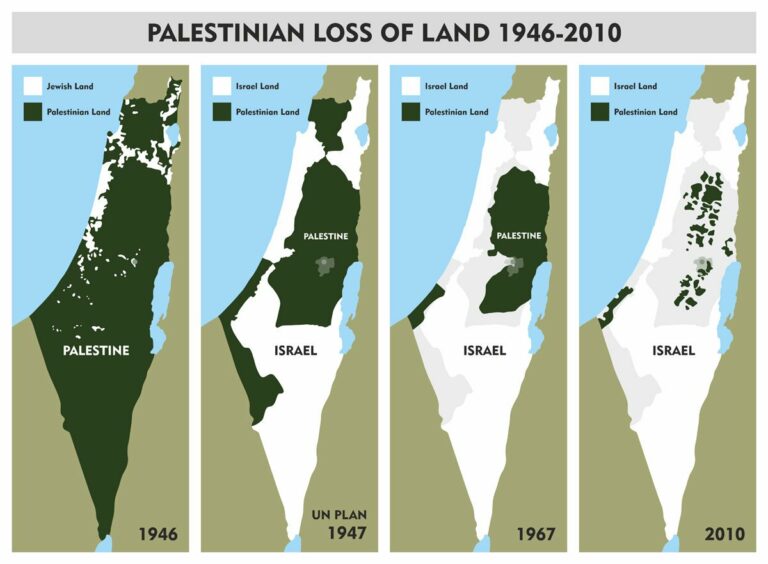This is an episode of Reality Asserts Itself, produced on October 17, 2013. On Reality Asserts Itself with Paul Jay, historian Peter Kuznick analyzes Obama’s claim of an enlightened US foreign policy.
PAUL JAY, SENIOR EDITOR, TRNN: Welcome back to The Real News Network. I’m Paul Jay in Baltimore. And this is Reality Asserts Itself. We’re continuing our series of interviews with Peter Kuznick on the whole theory of American exceptionalism. Peter now joins us in the studio.
Peter is professor of history and director of the Nuclear Studies Institute at American University. He’s cowriter of the ten-part Showtime series called Untold History of the United States. And there’s now a 12-part of that series coming out, two new episodes, on a DVD and through digital download all over the place, and that’s coming out as we speak.
Thanks for joining us again Peter.
PETER KUZNICK, PROF. HISTORY, AMERICAN UNIVERSITY, WASHINGTON: Hey, Paul.
JAY: And let me say I’m kind of looking forward to seeing these two parts, ’cause I’m particularly interested in the one of the Philippines. As we talked in part one, we started talking about America’s war against the people of the Philippines, and that gets very little coverage. I mean, I would venture to say 99 percent of our audience who’s under the age of–well, I’ll bet you most of our audience knows nothing about the war of the Philippines. But young people absolutely know nothing about the war in the Philippines.
KUZNICK: Well, you’re raising a sensitive point, because not your audience, but most Americans know nothing about American history. That’s one of our big concerns, that according to the national report card issued in June 2011, high school seniors tested lower in U.S. history than they did in math or science. The lowest of any area, the area they knew the least, was U.S. history. Twelve percent of U.S. high school seniors were judged to be proficient in American history. But even that’s misleading, because only 2 percent could identify the issue that Brown v. Board of Education was addressing, even though the answer was obvious from the way the question was posed. So we have a real problem, first, that people don’t know any history, and secondly, that most of what they know is wrong.
JAY: And let me just add one little segue, caveat to that, which is in Ontario–I grew up in Toronto, and you can get through the whole of high school with one history credit. I’m on the advisory committee to a masters of journalism program at a university in Ontario, and you can finish your masters in journalism and have taken only one high school history credit. And now you’re supposed to go out and do journalism.
KUZNICK: My whole project with Oliver is based on the idea that history is important, that everybody has an understanding of history, and what their view of history is, no matter if it’s well articulated or not, is going to shape what they–not only what they think of the past, but what they think of the future, what they think of future possibilities. When you’ve got such a narrow, constrained, distorted view of history, you can’t think, you can’t imagine that you could create a future that’s different from the present. I see that all the time with the students and with others in American society. There’s no utopian thought anymore. They can’t envision a different society, a different way of relating, a different kind of world. And that limits their ability to act.
JAY: Right. Okay. Let’s pick up where we left off in part one. You talked about the war in the Philippines being a major shift. But before that, America–now, let’s–again, the narrative is all about America the progressive, America the revolutionary, America fighting for independence, and we can never forget slavery and the genocide against native people. So the American narrative already starts with an exception to how wonderful we all are, because you could be wonderful and still have slavery, you can be wonderful and still wage genocide. That being said, America wasn’t going to be the country of foreign adventures, and then it was. So talk a bit about that shift and why you think it took place.
KUZNICK: You have to put it in the context of the 1890s. And in 1893, the United States suffered its greatest depression up to that point. You have to remember the United States had cyclical depressions–1819, 1837, 1857, 1873, a little bit in 1883. Then the big one hit in 1893 and there was millions unemployed. People were riding the rails. They were hobos, and they were trying to sleep in police stations for the winter so that they would at least be able to keep warm and get fed. This was a terrible time. And this was a depression that endured, and it lasted. There were uprisings around the country.
But there were really two fundamental ways to get out of that. One was to–because it was a depression based on overproduction–America’s factories, American industry was booming during that time. And so they were producing more than the American market could absorb, the way it was structured. So there were two possible alternatives to that. The progressive alternative is to raise standard of living so that people could actually buy those surplus goods.
JAY: Raise wages.
KUZNICK: Yeah, raise wages. And the other alternative was to look for markets overseas. And that’s the view that triumphed. And if you look at the statements of the leading industrialists of the time, the Rockefellers and others, they were all talking about the fact that American production has outstripped America’s capacity to consume, and we’ve got to find overseas markets. In addition to the markets, we wanted the cheap labor as well.
JAY: And raw materials.
KUZNICK: And raw materials, yeah. They all go together.
JAY: And there’s nothing new about that in a sense. That’s what colonialization, European colonization to a large extent was about, maybe less about the problem of overproduction, but certainly finding raw materials, finding new markets.
KUZNICK: But the Americans had a different vision. We were going to accomplish everything that the Europeans had. We were going to get all the benefits of Empire without being a colonial force. That was the American idea. We saw how tied down the kind of big bureaucracies that the Europeans needed to become colonial powers. The United States never develops that in that way, or at least not till much later.
So what we have is what we call an open-door empire. Secretary of State John Hay issues these “Open Door” notes, and we’re going to be able to batter down all the barriers. We’re going to get access to the markets. We want a world of free trade in which we have access to all those people. So we’re opposed to those kind of colonial spheres that exclude the United States. And so that’s our vision. It’s a different vision than the Europeans had.
And we even–if you look at Wilson versus the French and the British during World War I, Wilson’s 14 points were predicated on the idea that there wasn’t going to be this kind of colonial distribution afterwards. However, Wilson caves in time after time after time and allows them to follow through on the secret treaties that they had established before World War I, even that Lenin later exposes. But Wilson allows them to keep those deals. In exchange, he was hoping for establishing the League of Nations. The idea was that we’ll create the League of Nations in order to clean up all the problems that were resulting from the agreements that we had made at Versailles.
JAY: Now, this idea that America is the city on the hill, that God gave us this–we’re going to keep the world from chaos and this–we have higher ideals. But then there’s always exceptions to that. So, in other words, I was saying to you off-camera, you know, Europe does bad things for bad reasons. America does bad things for good reasons. But on the other hand, the real practice is [crosstalk] Well, let’s go back to the Monroe Doctrine and the whole–how do you explain that we’re the country of justice and liberation and sovereignty and everything else, and then we say, well, except that we own Latin America, and everybody in Latin America better submit to us?
KUZNICK: Because we’re going to go there to civilize them. We going to uplift them. We’re going to raise their standards of living. We’re going to improve their education. And you see how much they love us now, so it must’ve worked.
But we have a lot of exceptions. The United States, like other countries, is full of contradictions. The treatment as you were saying, of Native Americans is not something that Americans are proud of. There’s still a big controversy of whether or not to change the Washington Redskins’ name which is now all over the news. But Americans’ treatment of the Native Americans, the genocide against Native Americans is universally condemned now and considered shameful, at least in the last two decades. Slavery is universally condemned and considered to be shameful.
We haven’t dealt with the consequences of either of those problems in any serious way, but at least if you look at America’s textbooks, they’re not going to be celebrating the genocide against the Indians, they’re not going to be celebrating the enslavement of African-Americans.
JAY: Which at the time they did.
KUZNICK: Which they did till quite–much more recently. It was part of this uplifting, civilizing mission that the white men in the Northeast were going to conduct for all of humanity. And we continue to have that view in terms of our foreign involvement. That’s a view that still exists to a large extent. There are still historians, as you were saying, who are going to support what the United States did in the Philippines and as part of this Christianizing, uplifting mission.
It gets complicated. It gets complicated a little bit after World War I. World War I is not a popular war in its aftermath. It wasn’t very popular at the time, between the gas warfare and the trench warfare. I mean, that’s not going to be very popular. In the aftermath of World War I, the nation recoils and there is a strong antiwar sentiment [incompr.] it takes Roosevelt a long time to get the Americans to agree to go into World War II, and there was still a lot of resistance.
But then, after World War II, the United States comes out of World War II as, again, this shining knight on the white horse, and the United States is this civilizing force, and we’re fighting the good war now against communism, at least by 1948.
So World War II, although even that, because of the atomic bombing and because of what we learn about World War II, it’s hard to have that untrammeled, unvarnished sense of American greatness. But it continues through the 1950s to a large extent and through the early 1960s. And it’s really Vietnam that changes the narrative. Much like Iraq and Afghanistan are changing the narrative again, Vietnam changed the American narrative in the ’60s.
JAY: Well, before we get to Vietnam, the ability of this official narrative, which is mostly total mythology–I mean, yeah, there’s–you could say, you know, maybe the Belgians were more brutal in the Congo than the Americans were in Guatemala [incompr.] they didn’t cut people’s hands off and hang them from trees and things, but certainly many of the regimes that have been supported in Latin America and around the world have been, you know, every bit as brutal as European colonialism was.
Yet there’s still this ability to keep this narrative that Barack Obama can say what he said, and it seems perfectly reasonable. And let me just play the quote of Obama again, just to remind everybody what it was.
~~~
BARACK OBAMA, U.S. PRESIDENT: Some may disagree, but I believe America is exceptional–in part because we have shown a willingness through the sacrifice of blood and treasure to stand up not only for our own narrow self-interests, but for the interests of all.
~~~
JAY: It’s a narrative that still can be talked about.
KUZNICK: Yes. But Obama–that wasn’t his position originally. During the 2008 campaign, he says–he was asked about it. He says, I believe in American exceptionalism as I suspect the Brits believe in British exceptionalism and the Greeks in Greek exceptionalism. And he got pounced upon. Right? The neocons and the conservatives all jumped on him. McCain–.
JAY: Yeah, let me–I’ll read you a quote from Mike Huckabee about that. Huckabee says, “His”–meaning Obama’s–“worldview is dramatically different than any president, Republican or Democrat, we’ve had.” “He grew up more as a globalist than an American.” And here is, of course, the punchline: “To deny American exceptionalism is in essence to deny the heart and soul of this nation.”
KUZNICK: Yeah, and that was a view–that’s probably the strongest statement of it, but others said the same thing. And Obama learned–in typical Obama fashion, he didn’t learn the right lesson. He didn’t learn that you stand up on principle and you educate the American people as to why this is a dangerous philosophy, American exceptionalism. He embraced American exceptionalism. When the troops came back from Fort Bragg, what–Obama’s greeting to them was really troubling. Obama says to the troops coming back from Iraq–he greeted them at Fort Bragg, and he commended their willingness to sacrifice so much for a people that you never met, which is “part of what makes us special as Americans. Unlike the old empires, we don’t make these sacrifices for territory or for resources. We do it because it’s right. There can be no fuller expression of America’s support for self-determination than our leaving Iraq to its people. That says something about who we are.” And then he goes on to say: “… the values that are written into our founding documents, and a unique willingness among nations to pay a great price for the progress of human freedom and dignity. This is who we are. That’s what we do as Americans,” you know, paying a unique price.
What did Alan Greenspan say? He said, of course this war is about oil. He says, why can’t the Americans accept the fact? And Greenspan’s not a raving liberal. He was the former head of the Federal Reserve. But Obama’s got to cloak it in this idea of this noble mission. It’s very, very dangerous. Even Vietnam, if you look now, Obama has called for a 13-year reassessment and commemoration of Vietnam. As other presidents before him, he once had a critical narrative on Vietnam, but now he’s embracing Vietnam. Again, very dangerous.
Recent surveys show that 51 percent of 18- to 29-year-olds think that the Vietnam War was worth fighting and justified. This is shocking to some of us, any of us who lived through that period, to see this kind of sea change among young Americans. But you hear this kind of rhetoric, you see somebody like Obama, who they think is progressive, embracing Vietnam to a much greater extent than before, and it distorts their view of what the United States should do and can do in the world. The reality of Vietnam, as you know, was one of the worst bloodbaths in the 20th century.
JAY: Millions of people killed.
KUZNICK: Yeah. And if you ask young people how many millions were killed, they estimate between a half million and a million Vietnamese died in the war. When Robert McNamara came into my class, he told my students that he accepts that 3.8 million Vietnamese died in the war. McNamara was the architect of that war. Three-point-eight million.
I did this calculation recently. If you go down to the Vietnam War Memorial, you look at that, it’s got the names of 58,272 Americans who died in the war. The message is the tragedy of Vietnam is that 58,272 Americans died. The Okinawa war memorial, which I think is a real war memorial, has the names of all the Okinawans who died, all the Japanese, all the Americans, all the Brits, all the Australians, all the people who died. That sends a message about war. The Vietnam Memorial sends a very different message. It’s 146 feet long. If they included the names of all the Vietnamese, all the Cambodians, all the Laotians–I calculated recently it would be over four miles long. Could you imagine a war memorial over four miles long in the heart of Washington, D.C., and the message that that would send? I think that that would be the message that that really needs to get out there.
And to me it’s shocking, again, American historical ignorance. If you ask–I ask my students, how many Jews died in the Holocaust, all the hands go up. They all know the 6 million figure. But imagine how we would feel, because they have no idea how many Vietnamese died in their own war. But the atrocities committed by their country they don’t know. They know the atrocities committed by other countries.
What would we feel if the average German student thought that, let’s say, 1 million Jews died in the Holocaust? We would be appalled at the moral depredation that’s gone on there to allow them to not understand their history in the atrocities. But the Germans do. They’ve studied it.
The Americans don’t. Maybe they know something about the Native Americans now in a general sense [incompr.] about slavery. But they don’t know–as you were saying, they don’t know about the Philippines. They don’t know about this narrative that we’re trying to convey, which is not just about American flag-waving and all the good things we do. Yeah, the United States does a lot of good things. But it’s about the terrible things that the United States does.
JAY: And part of that narrative is that if Assad uses chemical weapons and kills several thousand people, that is an absolutely unacceptable red line. But if the United States dropped atomic bombs and actually used the worst weapons of mass destruction on a civilian population, within this narrative it can all be justified. And, well, make this point, and then we’re going to go to the next segment.
KUZNICK: And it is justified, because right now the United States, at the Udvar-Hazy Annex of the Air and Space Museum, this national museum, is displaying the Enola Gay, the plane that dropped the first atomic bomb on Hiroshima. And instead of being critical of the era of weapons of mass destruction, General John “Jack” Dailey, the head of the aerospace museum, announced in 2003–when they announced this, he said, we’re going to display the Enola Gay in all of its glory as a magnificent technological achievement. We celebrate this, we celebrate the atomic bombs dropping, even though, as we show in our Untold History, in our book and our documentary series, there was no military justification, no moral justification. It wasn’t necessary to end the war. And it didn’t end the war. That’s another fallacy in the United States. It was the Soviet invasion that ended the war.
JAY: And we’d done a whole segment on this, and you should watch this whole series on Untold History, ’cause it’s really good.
Alright. In the next segment of our interview, Peter and Oliver were in Japan recently, and it was on the anniversary of the Hiroshima/Nagasaki bombing. And in the next segment, I’m going to ask Peter, well, what do they think of American exceptionalism?
Please join us for the continuation of our discussion on Reality Asserts Itself on The Real News Network.
Never miss another story
Subscribe to theAnalysis.news – Newsletter
“Peter Kuznick is a professor of history and director of the award-winning Nuclear Studies Institute at American University and is currently serving his sixth three-year term as a distinguished lecturer with the Organization of American Historians. He has written extensively about science and politics, nuclear history, and Cold War culture.”








